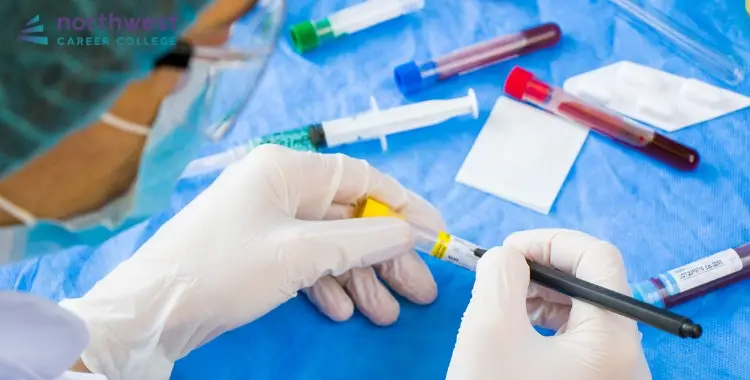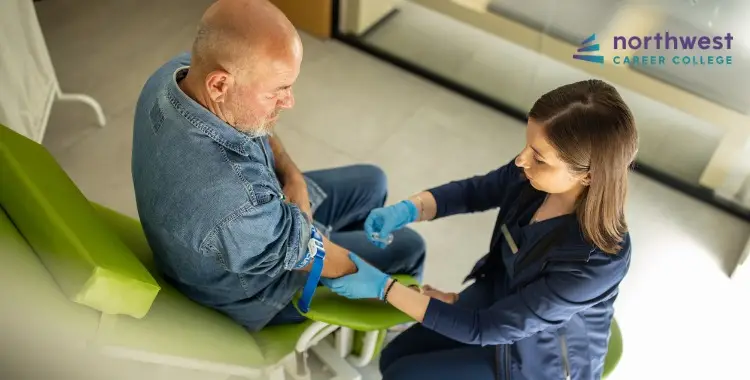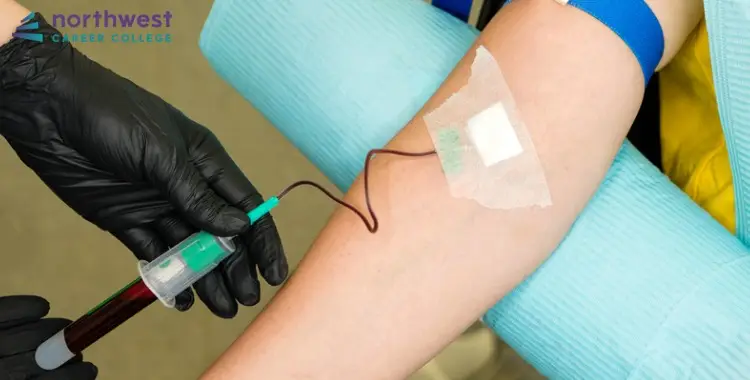What to Expect in Your First Year as a Phlebotomy Technician
- Phlebotomy Technician
- May 23, 2024
- 2.3k views
- 4 min read

Phlebotomy is an exciting career path in the healthcare industry. As a Phlebotomy Technician, your first year will allow you to learn and grow professionally. Let’s look at what you can expect on this career path.
Table of Contents
Introduction to the Phlebotomy Profession
Your journey begins with understanding the full scope of a Phlebotomy Technician’s duties. You will learn that your primary responsibility is to collect blood and ensure the samples are properly handled, stored, and transported. The role extends to performing administrative tasks such as labeling specimens and entering patient information into databases.
Early training focuses on acquiring the core skills needed for adequate blood collection. Depending on the patient’s age, health, and medical requirements, this includes learning techniques like venipuncture, finger sticks, and heel sticks.
Extensive Hands-on Training
Phlebotomy education heavily focuses on practical experience. Training programs often include lab sessions where you practice on mannequins before moving on to live draws with actual patients. These sessions help you gain confidence and refine your technique under the guidance of experienced instructors.
Learning Important Safety Protocols
One of the first and most important aspects of your training will be learning about infection control and safety protocols. These are critical to preventing cross-contamination and ensuring the safety of both patients and healthcare workers. You will become familiar with personal protective equipment (PPE) and the proper procedures for disposing of contaminated supplies.
Needlestick injuries are a significant hazard in phlebotomy. You will learn techniques to minimize this risk, including using safety-engineered devices and proper needle disposal methods. Training programs stress the importance of following protocols to protect yourself and others from potential harm.
Building Interpersonal Skills
Phlebotomy Technicians often deal with patients who may feel anxious or fearful about having their blood drawn. Part of your training will involve learning how to communicate effectively with patients, provide clear explanations, and offer comfort to ease their concerns.
You will discuss ethical considerations in healthcare, especially patient privacy and consent. Understanding these moral principles is crucial as you handle sensitive patient information and perform procedures.
Preparation for Certification
Most new phlebotomists start preparing for the Phlebotomy Technician certification exam near the end of the first year of employment. Most employers require certification, so passing this exam is crucial to becoming a professional phlebotomist. However, Northwest Career College students must sit for their certification exam before graduation, giving them a leg up on graduates from other programs entering the field without certification!
Exam preparation includes reviewing all key concepts covered during the year, from phlebotomy techniques and safety protocols to legal and ethical issues. This comprehensive review ensures you are well-prepared for the exam and your subsequent career.
Career Readiness and Advancement
Many training programs assist with career readiness, helping you prepare your resume and develop interviewing skills. These tools are essential as you begin applying for jobs and presenting yourself as a qualified candidate.
As a Phlebotomy Technician, you will have opportunities for career advancement through continuing education. Learning about specialized areas of phlebotomy, such as apheresis or advancing into supervisory roles, can provide paths for growth and increased responsibility.
Conclusion
As a Phlebotomy Technician, your first year on the job will be a period of immense growth and learning. This year will be crucial in laying the foundation for a fulfilling healthcare career, as it will equip you with both technical and soft skills necessary for positively impacting patient care.
During this time, you’ll face unique challenges and opportunities that will help shape your expertise in phlebotomy. This foundational year lays the groundwork for a rewarding healthcare career, equipping you with the knowledge and abilities to positively impact patient care.





